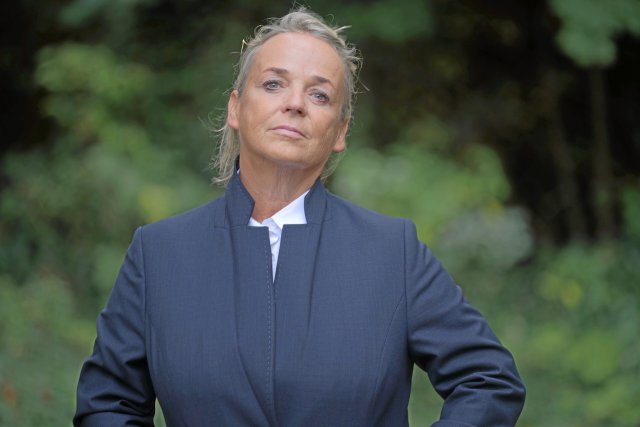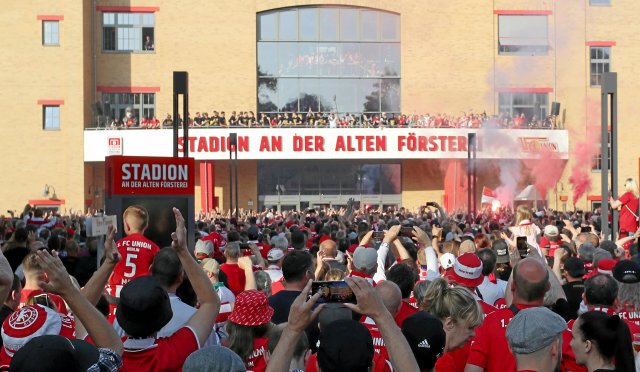Annekatrin Hendel made a “film about the Alte Försterei, the operations in and around the stadium”. At the end, fans, team and employees of the club will celebrate qualification for the Champions League on May 27, 2023.
Photo: imago/Contrast
What was your impetus or thought in planning and making this film?
I’ve had the idea of making a film about 1. FC Union for a long time. But there was so much going on in my company and I didn’t have the right employees who could support it. And then our producer, who was in America for a long time, came back at the beginning of 2021 and asked: “Why don’t we make a film about Union?” As if she had suspected it, even though I hadn’t talked about it at all. Then I called Christian Arbeit and asked: “How’s it going?” A short time later we sat together, he already knew my films – and then somehow it started right away. Well, it was ultimately a spontaneous thought, but everything happened very quickly.
How long have you had the idea?
This started before the climb. Because Wuhlheide is also my home. I come here from the forest, from the Wuhlheide. I was interested in the club, rather the company itself. And the question was, as in many of my films, whether an East German spirit still exists here. For me, Union is a relevant example of something where East Germans do something that amazes you. It’s a phenomenon, this underdog, now the largest East German football club, so relevant and very present in the media. I wanted to say something positive because it is often said that the East Germans are right-wing and are shit. Even more so in this super election year.
Interview

Photo: Martin Farkas
Annekatrin Hendel knows everything about film. In 1987 she started as a costume and set designer, followed by directing, scripting and production, with her own company since 2004. Many honors, including two Grimme Prizes, too. She was also on the board of the German Film Academy from 2018 to 2023. The 60-year-old East Berliner has now found a piece of home at 1. FC Union – a “social film” was made about the football club from Köpenick, which will be released in cinemas on April 4th.
That fits with the end of the film: Union gets into the Champions League. Was that a happy coincidence for you? And how long was the project actually planned?
From the start, it wasn’t intended to be a documentary of just one season. We’ve already started 2021 and I definitely wanted to extend it beyond a summer break because that’s where most of the work is done. Because it’s a film about the work here, about the company. So it was always clear that I wanted to shoot in two seasons. But actually the film should have been finished at least a year earlier. But then there was the prospect of the Champions League – and with the chance to achieve such great things, I just didn’t stop shooting.
Is it a football film?
First and foremost it is a social film. But I also think it’s a football film. It was important to me that football was also shown. Maybe a little different than usual. It is, above all, a film about the Alte Försterei, about the operations in and around the stadium, where football has been played for over 100 years – and which, after the renovation, will no longer be what it is today. This also makes it a film about an era that is coming to an end. It doesn’t end with entry into the Champions League, but with moving out of the Forsthaus, the club’s office.
The atmosphere is also unusual: it is a very quiet film.
You can see cheering, hustle and bustle, cheerfulness in every football stadium, in every film, in every broadcast, every week on all channels. I was interested in other things. For example, the music was clear from the start. I wanted Flake to do it, who I had already worked with on my film “Fassbinder”. He developed the ideas on the computer and later recorded them on his piano. A very nice thing, just a piano, no noise, no booming, nothing bloated. Because for me Union is not bloated, but simple, human, organically developing. And I was also interested in whether it works if you use quiet tones, because football also has elements like that, humility for example.
Were there any unexpected moments, events or topics that pleasantly surprised you?
There was something surprising every day. I had no idea either, I came here and stood like a cow in front of the new gate. I really didn’t know how things worked here and how football was organized in this league. And really, I learned a lot. The biggest surprise for me: how important football is for our society, especially live in the stadium. I didn’t know it was such an important community space, one of the few places where there is adequate space for many different bubbles that otherwise never come into contact with one another. That’s why I’m very happy that I discovered it and experienced it and can show it. What I also didn’t know was that ultras are the largest youth culture. You invest an incredible amount of time and work. And so I was very happy that I was able to shoot the scene after a long time. That is a great privilege.
Did you have an idea that couldn’t be realized?
No, I wanted to see what was going on here. I actually only had one theory, and I wasn’t disappointed, but confirmed. In that Union is somehow an East German club and I find something that I know. I belong to the last adult generation from the East, terms like collective and solidarity mean a lot to me. I love workspaces where supervisors and consultants are not necessary, but decisions are made together. This also means that women here take on a lot of responsibility with great freedom and as a matter of course. The women have a lot to say here – without there being a quota (laughs). The film can show that.
In contrast to films like “Fassbinder” or “The Brasch Family,” Union does not involve individual protagonists, but rather many people.
I’ve already tried to find people who exemplify this company. There are the women, but also press chief Christian Arbeit and President Dirk Zingler. When it comes to fans, for example, there are two levels: Firstly, there are the ultras, whose work I show. And then there are the two fans who are my “commentators”. Two young men who do the podcast “Tactics and Drinking” and who talk about football as much as they can. But overall I shot with a lot more people than are in the film now. There is a four and a half hour version of the film with more characters. Finally, I narrowed it down to six main characters, where you can easily understand why they act the way they do and where their journey in this company leads, where and how their paths cross, and how decisions are made. I also did that with “The Brasch Family”.
Have you had any reactions from colleagues because you are making a football film?
I invited a few film colleagues to watch it, and there were some discussions. Everyone had seen a different film. Very interesting. I’m excited to see what viewers say when the film in the cinema you can see. I’m really looking forward to that.
Subscribe to the “nd”
Being left is complicated.
We keep track!
With our digital promotional subscription you can read all issues of »nd« digitally (nd.App or nd.Epaper) for little money at home or on the go.
Subscribe now!
